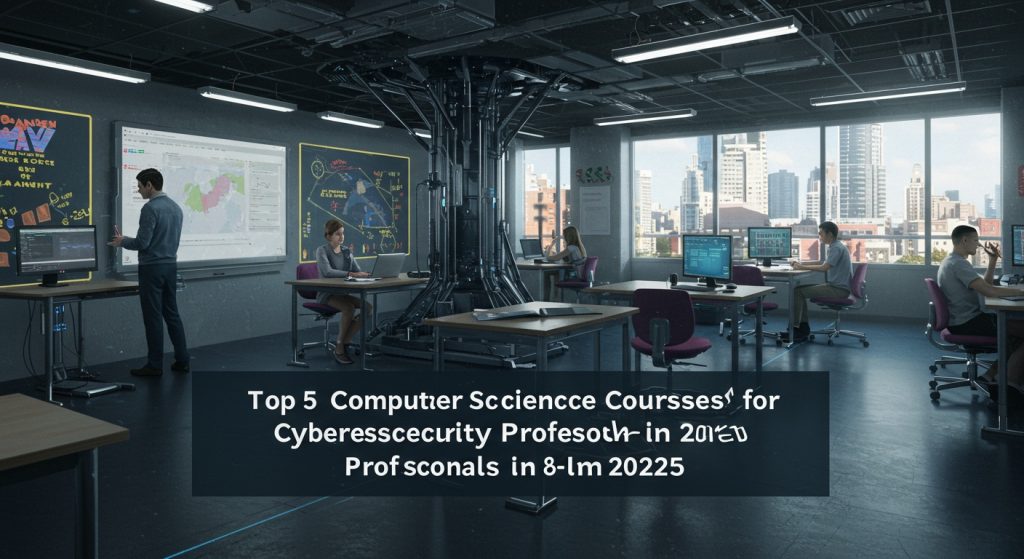The demand for skilled AI and Machine Learning professionals is surging, fueled by breakthroughs like diffusion models and the rise of generative AI. To thrive in this evolving landscape, a robust computer science foundation is crucial. We’ll explore top courses that equip you with the necessary skills, focusing on institutions adapting to the latest trends. Core areas like advanced algorithms, deep learning architectures (including transformers). Distributed computing will be examined. Discover programs prioritizing hands-on experience with frameworks like TensorFlow and PyTorch, alongside theoretical depth in areas such as Bayesian statistics and reinforcement learning, positioning you at the forefront of AI innovation.

Understanding the AI and Machine Learning Landscape
Artificial Intelligence (AI) and Machine Learning (ML) are rapidly transforming industries, creating a high demand for skilled professionals. Before diving into specific courses, let’s define these key terms:
- Artificial Intelligence (AI): The broad concept of enabling machines to perform tasks that typically require human intelligence. This includes learning, problem-solving. Decision-making.
- Machine Learning (ML): A subset of AI that focuses on enabling machines to learn from data without being explicitly programmed. ML algorithms can identify patterns, make predictions. Improve their performance over time.
- Deep Learning (DL): A subset of ML that uses artificial neural networks with multiple layers (hence “deep”) to review data with greater complexity. DL is particularly effective for tasks like image recognition, natural language processing. Speech recognition.
The distinction is vital because different courses might focus on different aspects of AI and ML. Some might provide a broad overview, while others delve into specific techniques like deep learning or reinforcement learning. Choosing the right course depends on your career goals and existing skill set. For example, a computer vision engineer would benefit from a course heavily focused on deep learning and convolutional neural networks. A data scientist might prioritize courses covering statistical modeling and machine learning algorithms.
Essential Computer Science Foundations for AI/ML
A strong foundation in computer science is crucial for success in AI and ML. Here are some core areas to consider:
- Mathematics: Linear algebra, calculus, probability. Statistics are fundamental. These concepts underpin many ML algorithms and are essential for understanding how they work.
- Data Structures and Algorithms: A solid understanding of data structures (e. G. , arrays, linked lists, trees) and algorithms (e. G. , sorting, searching) is essential for efficient data processing and model implementation.
- Programming: Proficiency in programming languages like Python, R, or Java is crucial for developing and deploying AI/ML models. Python, in particular, is widely used due to its extensive libraries like TensorFlow, PyTorch. Scikit-learn.
- Databases: Knowledge of database systems (e. G. , SQL, NoSQL) is essential for managing and accessing the large datasets used in AI/ML.
- Operating Systems: Understanding operating system concepts like memory management, process scheduling. File systems is beneficial for optimizing the performance of AI/ML applications.
Courses covering these topics provide a strong foundation for more advanced AI/ML courses. Without these fundamentals, understanding the intricacies of AI/ML algorithms and their implementation can be challenging.
Top Computer Science Course Categories for AI/ML in 2025
Here’s a breakdown of key course categories that will be highly relevant for AI and ML in 2025:
1. Machine Learning Fundamentals
These courses provide a comprehensive introduction to the core concepts and algorithms of machine learning.
- Topics Covered: Supervised learning (regression, classification), unsupervised learning (clustering, dimensionality reduction), model evaluation, regularization. Common algorithms like linear regression, logistic regression, decision trees, support vector machines. K-means clustering.
- Skills Acquired: Ability to comprehend and apply various ML algorithms, evaluate model performance. Select appropriate algorithms for different tasks.
- Example Courses: “Machine Learning” by Andrew Ng (Coursera), “Introduction to Machine Learning” (Stanford Online), “Pattern Recognition and Machine Learning” (University of Edinburgh).
2. Deep Learning Specialization
These courses focus on the theory and practice of deep learning, covering neural networks and their applications.
- Topics Covered: Neural networks, convolutional neural networks (CNNs), recurrent neural networks (RNNs), long short-term memory (LSTM), generative adversarial networks (GANs). Deep learning frameworks like TensorFlow and PyTorch.
- Skills Acquired: Ability to design, train. Deploy deep learning models for various tasks, including image recognition, natural language processing. Speech recognition.
- Example Courses: “Deep Learning Specialization” (Coursera), “TensorFlow Developer Professional Certificate” (Coursera), “PyTorch Scholarship Challenge from Facebook” (Udacity).
3. Natural Language Processing (NLP)
NLP courses focus on enabling computers to grasp, interpret. Generate human language.
- Topics Covered: Text processing, sentiment analysis, machine translation, text summarization, question answering. Language modeling.
- Skills Acquired: Ability to build NLP applications that can grasp and generate human language, examine text data. Extract meaningful insights.
- Example Courses: “Natural Language Processing Specialization” (Coursera), “Natural Language Processing with Deep Learning” (Stanford Online), “Practical NLP” (Fast. Ai).
4. Computer Vision
These courses cover the theory and practice of enabling computers to “see” and interpret images and videos.
- Topics Covered: Image processing, object detection, image segmentation, image recognition. Video analysis.
- Skills Acquired: Ability to build computer vision applications that can examine images and videos, detect objects. Perform image recognition tasks.
- Example Courses: “Computer Vision Specialization” (Coursera), “Computer Vision Nanodegree” (Udacity), “Deep Learning for Computer Vision” (Stanford Online).
5. Reinforcement Learning
Reinforcement learning courses focus on training agents to make decisions in an environment to maximize a reward.
- Topics Covered: Markov decision processes, dynamic programming, Monte Carlo methods, temporal difference learning. Deep reinforcement learning.
- Skills Acquired: Ability to build reinforcement learning agents that can learn to make optimal decisions in complex environments.
- Example Courses: “Reinforcement Learning Specialization” (Coursera), “Deep Reinforcement Learning Nanodegree” (Udacity), “Reinforcement Learning” (Stanford Online).
6. Data Science and Big Data Analytics
While not strictly AI/ML courses, these are essential for anyone working with large datasets in AI/ML.
- Topics Covered: Data cleaning, data visualization, statistical analysis, big data technologies (e. G. , Hadoop, Spark). Machine learning for big data.
- Skills Acquired: Ability to process, assess. Visualize large datasets, extract insights. Build data-driven applications.
- Example Courses: “Data Science Specialization” (Coursera), “Professional Certificate in Data Science” (HarvardX), “Big Data Specialization” (Coursera).
Choosing the Right Courses: Factors to Consider
Selecting the right computer science courses for AI and ML in 2025 requires careful consideration of your individual needs and goals. Here are some key factors to keep in mind:
- Your Background: Assess your existing knowledge and skills in mathematics, computer science. Programming. Choose courses that build upon your current foundation.
- Your Career Goals: Determine your desired career path in AI/ML. Are you interested in becoming a machine learning engineer, a data scientist, an NLP specialist, or a computer vision expert? Select courses that align with your career aspirations.
- Course Content and Structure: Review the course syllabus, learning objectives. Prerequisites to ensure that the course covers the topics you need to learn and is appropriate for your skill level.
- Instructor Expertise: Research the instructor’s background and experience in AI/ML. Look for instructors who are experts in their field and have a proven track record of teaching and research.
- Hands-on Experience: Prioritize courses that provide hands-on experience through projects, assignments. Case studies. Practical experience is essential for developing real-world AI/ML skills.
- Course Format: Consider the course format (e. G. , online, in-person, blended) and choose a format that fits your learning style and schedule.
- Cost and Time Commitment: Evaluate the cost of the course and the time commitment required to complete it. Make sure that the course is affordable and that you have enough time to dedicate to it.
Comparing Different Course Providers
Several online platforms and universities offer excellent computer science courses for AI and ML. Here’s a brief comparison of some popular providers:
| Provider | Pros | Cons |
|---|---|---|
| Coursera | Wide range of courses, specializations. Degrees from top universities. Flexible learning options. | Can be expensive, some courses may not be up-to-date. |
| Udacity | Industry-focused nanodegree programs with hands-on projects. Career services and mentorship. | More expensive than Coursera, less flexible learning options. |
| edX | Courses from top universities and institutions. Affordable options, including audit tracks. | Limited number of specializations, some courses may not be as comprehensive as those on Coursera or Udacity. |
| Stanford Online | High-quality courses taught by Stanford faculty. Rigorous curriculum. | More expensive than other online platforms, less flexible learning options. |
| Fast. Ai | Practical, hands-on courses focused on deep learning. Open-source library and community. | Less structured than other online platforms, requires some programming experience. |
Real-World Applications and Use Cases
The skills learned in these computer science courses can be applied to a wide range of real-world applications. Here are a few examples:
- Healthcare: AI/ML is used for disease diagnosis, drug discovery, personalized medicine. Robotic surgery. For example, deep learning models can assess medical images to detect cancer with high accuracy.
- Finance: AI/ML is used for fraud detection, risk management, algorithmic trading. Customer service. For example, machine learning algorithms can predict stock prices and identify fraudulent transactions.
- Manufacturing: AI/ML is used for predictive maintenance, quality control. Process optimization. For example, machine learning models can predict when equipment is likely to fail and optimize manufacturing processes to reduce waste.
- Transportation: AI/ML is used for self-driving cars, traffic management. Logistics optimization. For example, deep learning models can enable self-driving cars to navigate roads and avoid obstacles.
- Retail: AI/ML is used for personalized recommendations, customer segmentation. Inventory management. For example, machine learning algorithms can recommend products to customers based on their browsing history and purchase behavior.
These are just a few examples of the many ways that AI/ML is being used to solve real-world problems. As AI/ML technology continues to advance, the demand for skilled professionals in these fields will only continue to grow. Taking the right courses now can set you up for a successful career in this exciting and rapidly evolving field.
Conclusion
The pursuit of AI and Machine Learning expertise through computer science is more than just selecting a course; it’s about charting a course for your future. We’ve explored several top-tier programs, each offering a unique blend of theoretical foundations and practical application. Remember, the “best” course is subjective and depends heavily on your individual learning style, career aspirations. Preferred research focus. As you embark on this journey, consider this: theoretical knowledge alone is insufficient. Hands-on experience with projects, contributing to open-source initiatives. Actively engaging with the AI/ML community are crucial. For instance, consider contributing to libraries like TensorFlow or PyTorch; the practical knowledge gained is invaluable. Don’t be afraid to dive into Kaggle competitions or build your own AI-powered applications. The future of AI is rapidly evolving, with trends like federated learning and explainable AI gaining prominence. To thrive, continuous learning is essential. Success in this field isn’t just about mastering algorithms; it’s about adapting, innovating. Contributing to the ethical and responsible development of AI. Embrace the challenge, stay curious. Build the future you envision.
More Articles
The Top Universities For AI Research In The World In 2025
Top 5 NITs For Computer Science and Engineering Programs In 2025
Top Universities in California: A 2025 Guide
Top Ranking Factors: What Makes A University Great?
FAQs
Okay, so AI and Machine Learning are HUGE. What computer science fundamentals are most crucial for diving into those fields?
Great question! Think of it like building a house. Strong foundations in data structures and algorithms are essential – you’ll be using them constantly to optimize models and handle data. Also, a solid grasp of linear algebra and calculus is key for understanding how machine learning algorithms actually work under the hood. Don’t neglect probability and statistics either; they’re your guides for dealing with uncertainty and making predictions.
I’ve heard different universities have different strengths. What should I look for in a computer science program if I specifically want to focus on AI/ML?
Totally! You want a program with faculty actively researching in areas like deep learning, natural language processing, computer vision, or reinforcement learning – whichever excites you most. Check out their publications and research labs. Also, see if they offer specialized AI/ML courses beyond the introductory level. A strong emphasis on practical application, like capstone projects or internships, is a major plus too.
Is a Bachelor’s degree enough to get a good job in AI/ML, or am I definitely looking at needing a Master’s?
It depends! A Bachelor’s can definitely get you started, especially if you have relevant internships and projects under your belt. You might land a role as a junior data scientist or machine learning engineer. But, a Master’s degree often opens doors to more advanced roles, allows you to specialize further. Demonstrates a deeper understanding of the field. It’s a worthwhile investment if you’re serious about a long-term career in AI/ML.
What programming languages should I be fluent in if I’m aiming for AI/ML?
Python is the undisputed king! It’s got a massive ecosystem of libraries like TensorFlow, PyTorch, scikit-learn. NumPy that are essential for AI/ML development. R is also valuable, particularly for statistical analysis and visualization. While less common, knowing C++ can be beneficial for optimizing performance in computationally intensive tasks.
Besides coursework, what else can I do to beef up my resume and make me a more attractive candidate in the AI/ML job market?
Think hands-on experience! Contribute to open-source AI/ML projects on GitHub. Participate in Kaggle competitions to test your skills and build a portfolio of projects. Start your own AI/ML projects – even small ones – to demonstrate your initiative and problem-solving abilities. Network with people in the field by attending conferences and workshops. And, of course, get those internships!
Everyone talks about Deep Learning. Is it really as crucial as it sounds for all AI/ML jobs?
Deep Learning is a HUGE part of the field and drives a lot of innovation, particularly in areas like computer vision and natural language processing. While not every AI/ML job requires deep learning expertise, it’s definitely a highly sought-after skill. Learning the fundamentals of neural networks and frameworks like TensorFlow or PyTorch is a smart move.



